Preparing your home for sale is all about making a great first impression. Buyers need to envision themselves living in your space, so creating a clean, appealing, and functional environment is key.
Here’s a comprehensive guide on how to prepare your home for sale, focusing on budget-friendly strategies, effective planning, and common pitfalls to avoid.
1 The Best Approach: Prioritise Key Areas
Before diving into any projects, it’s essential to assess your home objectively. Think like a potential buyer—what stands out, both positively and negatively? Some rooms and areas influence a buyer’s decision more than others. Focus on these high-impact spaces:
- Curb Appeal: The exterior is the first thing buyers see. Mow the lawn, trim hedges, plant seasonal flowers, power wash the driveway and clean the gutters and windows.
- Kitchen: Consider small updates like changing hardware, painting cabinets, or adding a modern splashback. A fresh coat of paint or updated lighting can work wonders here.
- Bathrooms: Re-caulk, fix any grout issues, and replace outdated fixtures. A clean, well-maintained bathroom leaves a lasting impression.
The key is to keep your updates simple and neutral. Let buyers picture how they’d personalise the space.
2 Budget: Focus on Cost-Effective Improvements
You don’t have to break the bank to prepare your home for sale. Here’s a breakdown of smart, budget-friendly investments:
- Paint: A fresh coat of neutral paint is one of the most cost-effective ways to make your home look clean and updated. Stick to neutral tones like light grey, beige, or white to appeal to a broader audience.
- Declutter and Deep Clean: This is free but incredibly valuable. Removing personal items, excess furniture, and cleaning every nook and cranny helps the home feel more spacious.
- Small Fixes: Focus on fixing small issues like leaky taps, squeaky doors, or broken tiles. Buyers often notice these small details.
- Lighting: Replace outdated light fixtures with modern, affordable options. Ensure that every room is well-lit to make spaces appear brighter and more inviting.
Setting a budget at the start of your process will help you prioritise updates and avoid unnecessary overspending. Most improvements should focus on making the house presentable and functional rather than fully remodelling it.
3 Planning: Create a To-Do List and Timeline
Organisation is crucial when preparing your home for sale. Create a list of all the improvements you’d like to make, categorised by priority.
- Start with an inspection: If possible, get a pre-inspection to identify any major repairs that could affect the sale. Addressing these issues upfront can prevent last-minute surprises.
- Room by room: Tackle the most critical areas first, like the kitchen and bathroom. Move on to smaller tasks once the big ones are handled.
- Timeline: Work backward from your target listing date. Aim to finish all projects at least two weeks before your first open house to leave time for final touches and professional photography.
4 Why It’s Important: Maximise Value and Speed Up the Sale
A well-prepared home can attract more buyers, sell faster, and fetch a higher price. Staging and minor improvements can help buyers visualise the potential in the space, increasing its perceived value.
Additionally, a move-in-ready home tends to appeal more to buyers who don’t want to invest in repairs after purchase. You’ll be less likely to receive lowball offers if buyers feel they are walking into a polished, well-maintained home.
5 What Not to Do: Avoid Major Renovations and Over-Personalisation
When prepping your home for sale, there are some common missteps to avoid:
- Avoid major renovations: Large projects like adding a new bathroom or overhauling the kitchen might not give you the return on investment you expect. Focus on quick, simple updates that refresh the home without major expenses.
- Don’t over-personalise: Avoid bold design choices or too much personalisation. Neutral spaces allow buyers to see themselves living in the home. If your taste is specific, tone it down to a broader appeal.
- Don’t neglect minor issues: Small problems like chipped paint, cracked tiles, or a broken fence can make buyers wonder what bigger issues are lurking beneath the surface.
- Don’t forget about the yard: Neglecting outdoor spaces can be a big turn-off. Even if you don’t invest much, a neat and well-maintained garden or yard is essential for curb appeal.
Conclusion
Preparing your home for sale can feel overwhelming, but you don’t have to do it alone. At Fresh Spaces, we specialise in scoping, planning, and coordinating all the essential services you need to get your home market-ready—from minor repairs and deep cleaning to professional staging and curb appeal enhancements. With our expertise, you can focus on what matters most while we handle the details to ensure your property stands out.
Ready to make your home irresistible to buyers? Contact Detail 9 Fresh Spaces today and let us help you sell faster and for more!

